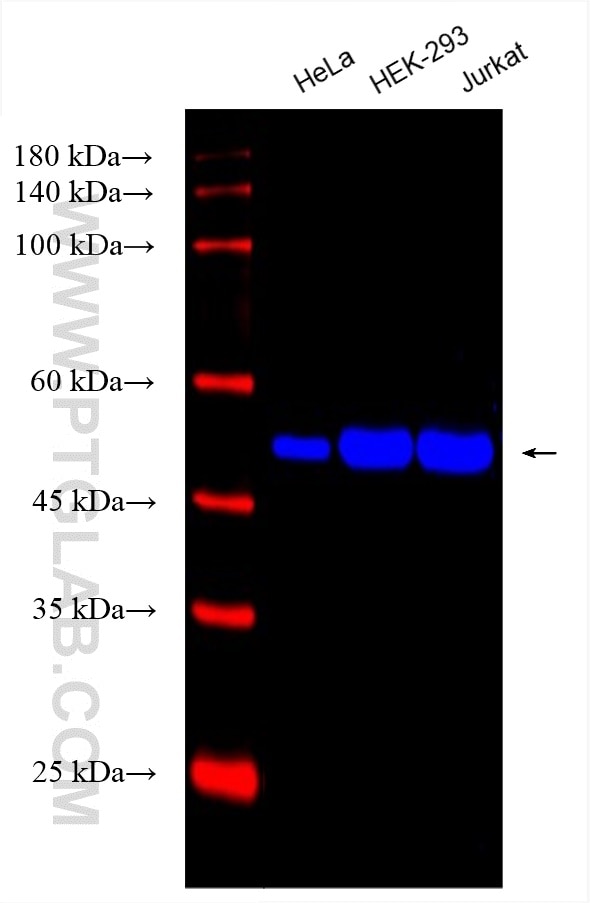CoraLite® Plus 750-conjugated Beta Tubulin Monoclonal antibody
Beta Tubulin Monoclonal Antibody for WB
Host / Isotype
Mouse / IgG2a
Reactivity
human, mouse, rat, nematode, pig, zebrafish
Applications
WB
Conjugate
CoraLite® Plus 750 Fluorescent Dye
CloneNo.
1D4A4
Cat no : CL750-66240
Synonyms
Validation Data Gallery
Tested Applications
| Positive WB detected in | HeLa cells, Jurkat cells. HEK-293 cells |
Recommended dilution
| Application | Dilution |
|---|---|
| Western Blot (WB) | WB : 1:1000-1:8000 |
| Sample-dependent, check data in validation data gallery | |
Product Information
CL750-66240 targets Beta Tubulin in WB applications and shows reactivity with human, mouse, rat, nematode, pig, zebrafish samples.
| Tested Reactivity | human, mouse, rat, nematode, pig, zebrafish |
| Host / Isotype | Mouse / IgG2a |
| Class | Monoclonal |
| Type | Antibody |
| Immunogen | Beta Tubulin fusion protein Ag0117 相同性解析による交差性が予測される生物種 |
| Full Name | tubulin, beta 3 |
| Calculated molecular weight | 450 aa, 50 kDa |
| Observed molecular weight | 50-55 kDa |
| GenBank accession number | BC000748 |
| Gene symbol | TUBB3 |
| Gene ID (NCBI) | 10381 |
| Conjugate | CoraLite® Plus 750 Fluorescent Dye |
| Excitation/Emission maxima wavelengths | 755 nm / 780 nm |
| Form | Liquid |
| Purification Method | Protein A purification |
| Storage Buffer | PBS with 50% Glycerol, 0.05% Proclin300, 0.5% BSA, pH 7.3. |
| Storage Conditions | Store at -20°C. Avoid exposure to light. Stable for one year after shipment. Aliquoting is unnecessary for -20oC storage. |
Background Information
There are five tubulins in human cells: alpha, beta, gamma, delta, and epsilon. Tubulins are conserved across species. They form heterodimers, which multimerize to form a microtubule filament. An alpha and beta tubulin heterodimer is the basic structural unit of microtubules. The alpha and beta tubulins (+/- 55 kDa MW) are homologous but are not identical. Beta tubulins have been widely used as loading control.
What is the molecular weight of beta-tubulin? Are there any isoforms of beta-tubulin?
The molecular weight of tubulin is 50-52 kDa. Humans have eight beta-tubulin isotypes, encoded by different genes, that differ in their C-terminal sequences. They have different tissue expression profiles and can rise to microtubules of different properties (PMID: 20191564).
How to use beta-tubulin as a loading control
Beta-tubulin is one of the most commonly used references as a loading control for cell lysates in western blotting. It is abundantly expressed across various tissues and developmental stages and highly conserved across species. However, since some variability has been observed in the expression levels of commonly used housekeeping genes (PMID: 15627964), it is recommended that more than one loading control antibody is used while developing new assays. More information can be found here: https://www.ptglab.com/news/blog/loading-control-antibodies-for-western-blotting/.
What drugs can influence beta-tubulin and organization of microtubules?
Many drugs that affect microtubule dynamics target beta-tubulin, mainly by interfering with the GTP hydrolysis (PMID: 21381049). Paclitaxel (Taxol) is used to stabilize microtubules by slowing down their depolymerization, while colchicine and vinca alkaloids (vinblastine) destabilize microtubules. They are used in research and also in the clinic as anti-cancer agents.
Is beta-tubulin post-translationally modified?
Yes, tubulins are subject to extensive post-translational modifications (PTMs) that affect the organization of microtubules and their dynamics. The most common modifications include polyglutamylation, polyglycylation, polyamination, glycososylation, glycation, phosphorylation, and acetylation (PMID: 24801181 and 25468068).
Protocols
| Product Specific Protocols | |
|---|---|
| WB protocol for CL Plus 750 Beta Tubulin antibody CL750-66240 | Download protocol |
| Standard Protocols | |
|---|---|
| Click here to view our Standard Protocols |


